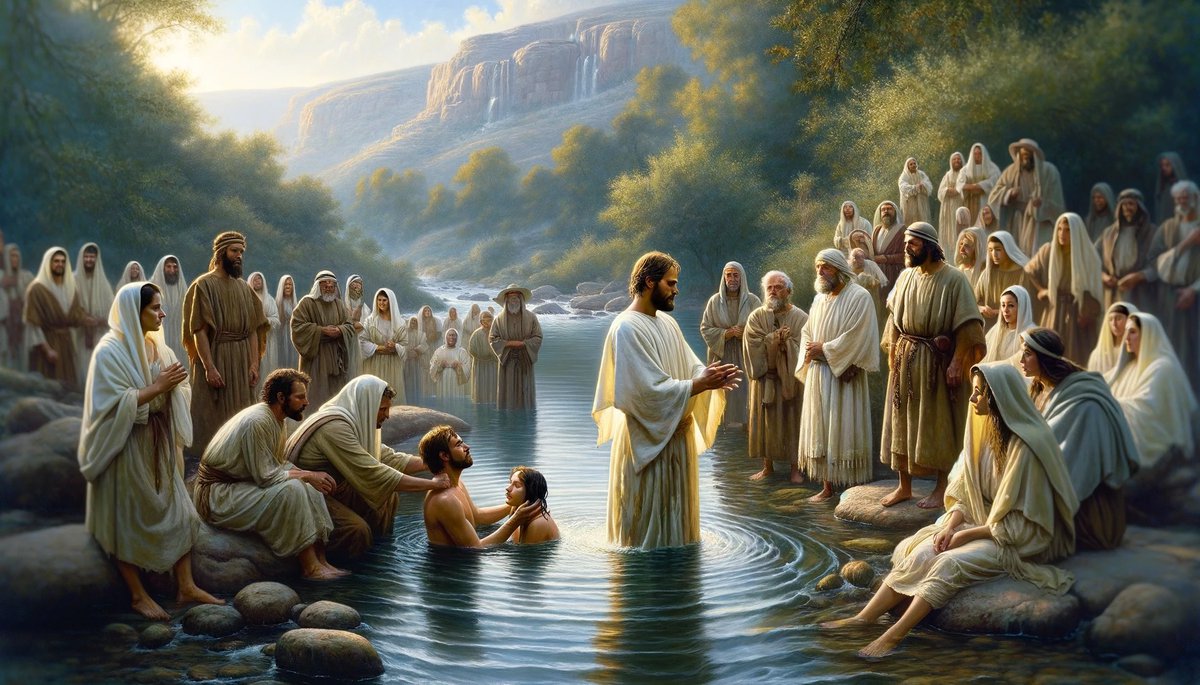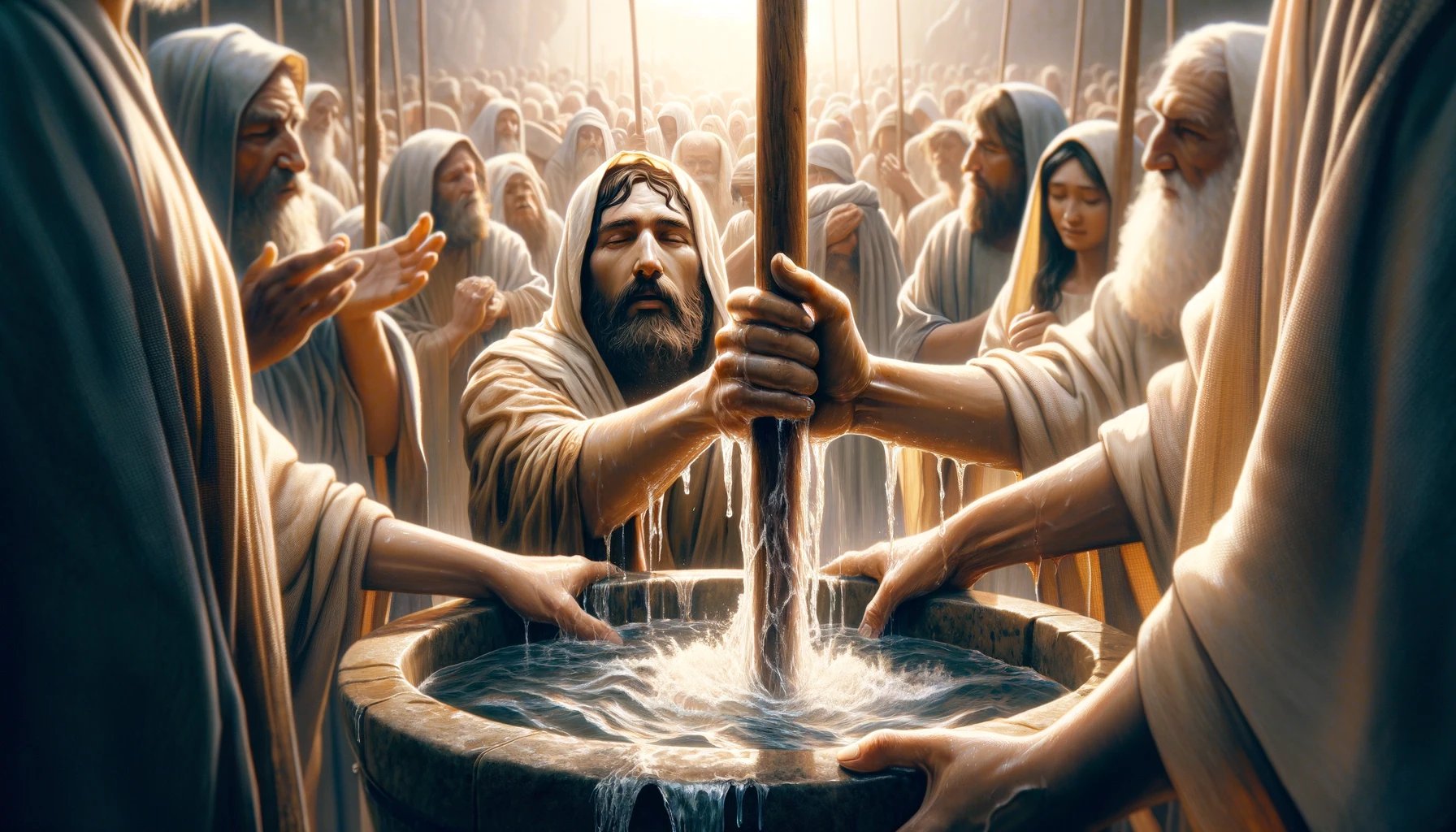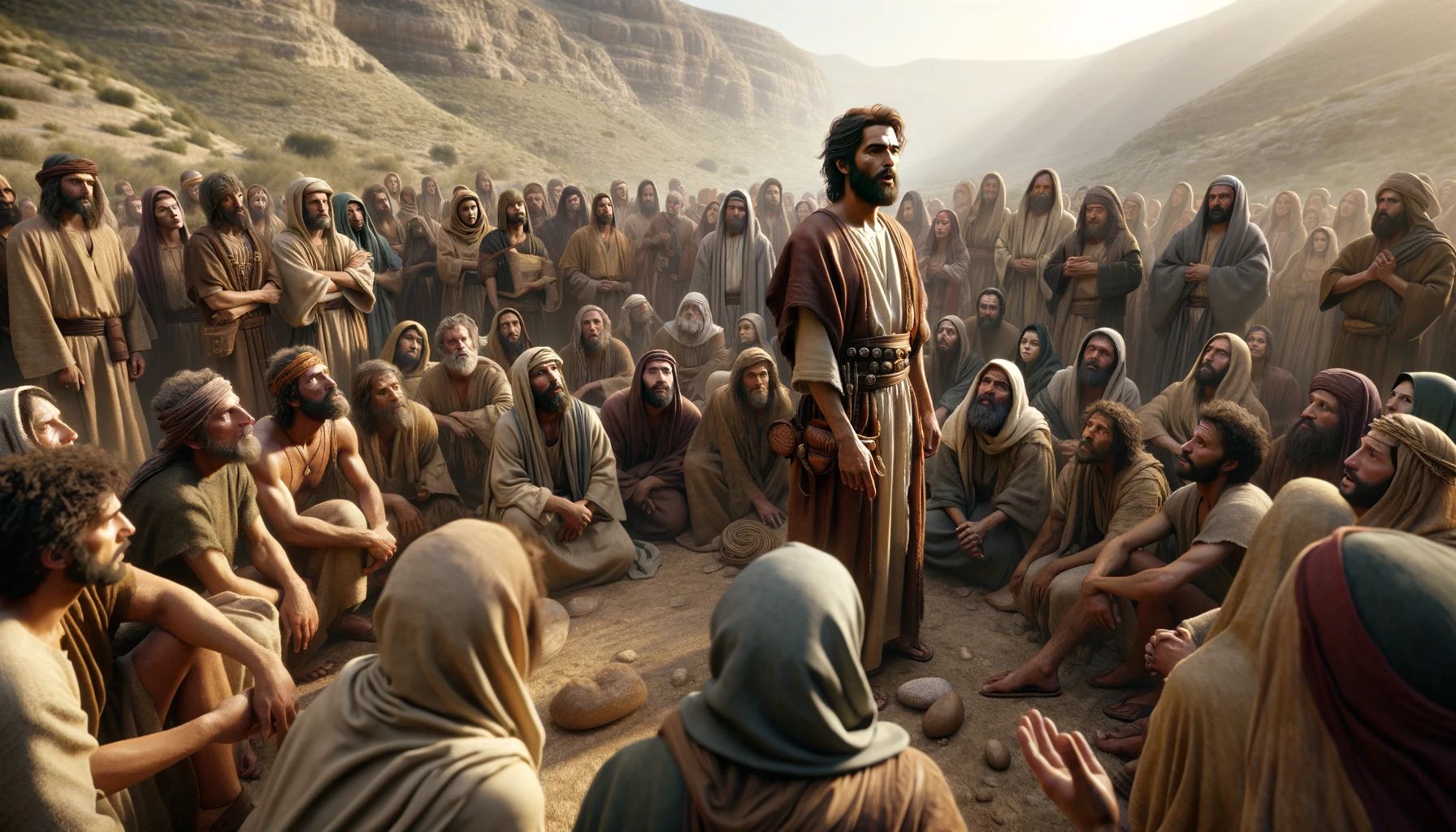Home>Theology and Spirituality>Why Was John The Baptist Considered The Greatest


Theology and Spirituality
Why Was John The Baptist Considered The Greatest
Published: February 20, 2024
Jason DeRose, Managing Editor at Christian.net, uses his expertise in religion and journalism to deepen understanding of faith's societal impacts. His editorial leadership, coupled with a strong academic background, enriches the platform’s diverse content, earning him recognition in both journalism and religious circles.
Discover why John the Baptist is revered as the greatest figure in theology and spirituality. Uncover the profound impact of his teachings and influence.
(Many of the links in this article redirect to a specific reviewed product. Your purchase of these products through affiliate links helps to generate commission for Christian.net, at no extra cost. Learn more)
Table of Contents
Introduction
John the Baptist, a towering figure in the New Testament, is often regarded as one of the most significant and enigmatic personalities in biblical history. His life and teachings continue to captivate the hearts and minds of believers and scholars alike, leaving an indelible mark on the Christian faith. As we delve into the depths of John the Baptist's character and his profound impact on the biblical narrative, we unravel the essence of why he is considered one of the greatest figures in the history of Christianity.
John the Baptist's life and ministry are shrouded in mystery and wonder, beginning with his miraculous birth to elderly parents, Zechariah and Elizabeth. His birth was foretold by an angel, signaling his divine purpose even before his conception. This divine intervention set the stage for a life dedicated to preparing the way for the Messiah and calling people to repentance.
Throughout the Gospels, John the Baptist emerges as a compelling and uncompromising figure, fearlessly proclaiming a message of repentance and spiritual renewal. His distinctive attire and ascetic lifestyle in the wilderness added to the allure and magnetism of his ministry, drawing crowds from far and wide to hear his powerful and convicting words.
As we explore the multifaceted dimensions of John the Baptist's character and his pivotal role in preparing the world for the arrival of Jesus Christ, we gain profound insights into the qualities that set him apart as a remarkable and revered figure in Christian history. His influence on Jesus, his fearlessness and boldness in proclaiming the truth, and his embodiment of humility and servanthood are just a few aspects that contribute to his enduring legacy.
In the subsequent sections, we will delve deeper into the various facets of John the Baptist's life and ministry, unraveling the reasons behind his exalted status as one of the greatest figures in the biblical narrative. Through this exploration, we aim to gain a deeper understanding of the profound impact of John the Baptist and the timeless relevance of his message in the contemporary world.
Read more: Why Is John The Baptist The Greatest Prophet
John the Baptist's Role in the Bible
John the Baptist's role in the Bible is pivotal, serving as a herald and forerunner of Jesus Christ. His birth, as prophesied by the angel Gabriel, marked the beginning of a divine mission to prepare the hearts of the people for the arrival of the long-awaited Messiah. The Gospel of Luke vividly portrays John's significance, describing him as the one who would "go before the Lord to prepare his ways" (Luke 1:76).
John's ministry was characterized by a fervent call to repentance and a baptism of water, symbolizing spiritual cleansing and renewal. His proclamation in the wilderness echoed the prophetic voices of the Old Testament, particularly Isaiah, who foretold the coming of a voice crying out in the wilderness, "Prepare the way of the Lord, make his paths straight" (Mark 1:3).
Furthermore, John's baptism of Jesus in the Jordan River marked a profound moment in biblical history, signifying the transition from the old covenant to the new covenant. This act of identifying Jesus as the long-awaited Messiah and the Lamb of God exemplified John's pivotal role in ushering in a new era of salvation and redemption.
John's unwavering commitment to his divine calling, coupled with his uncompromising message of repentance, challenged the religious norms of his time and stirred the hearts of the people. His influence extended beyond the confines of traditional religious institutions, drawing multitudes to the wilderness to heed his prophetic exhortations.
In essence, John the Baptist's role in the Bible transcends mere historical significance; it embodies the fulfillment of ancient prophecies and the inauguration of a new era in the redemptive narrative. His life and ministry set the stage for the arrival of Jesus Christ, laying the foundation for the transformative impact of the gospel message.
As we reflect on John the Baptist's role in the Bible, we are reminded of the profound purpose woven into the fabric of his existence. His unwavering commitment to preparing the way for the Messiah and his unyielding dedication to proclaiming the message of repentance exemplify the timeless relevance of his contribution to the biblical narrative.
John the Baptist's Influence on Jesus
John the Baptist's influence on Jesus transcends the realms of mere historical interaction; it embodies a profound spiritual and theological significance that reverberates throughout the New Testament narrative. As cousins, their lives intersected in a manner that would profoundly impact the course of Jesus' earthly ministry.
The pivotal moment of John baptizing Jesus in the Jordan River stands as a defining instance of their interaction. This act not only symbolized Jesus' identification with humanity but also marked the commencement of his public ministry. The profound symbolism inherent in this event underscores John's instrumental role in inaugurating Jesus' mission, affirming his divine identity, and foreshadowing the redemptive purpose that would unfold.
Moreover, John's unwavering proclamation of Jesus as the "Lamb of God" and the "Son of God" served as a catalyst for shaping the public perception of Jesus. By heralding Jesus as the long-awaited Messiah, John played a pivotal role in preparing the hearts and minds of the people for the imminent arrival of the Savior. His unwavering conviction and bold declaration of Jesus' divine nature laid the groundwork for the acceptance and recognition of Jesus' messianic mission.
Furthermore, Jesus' affirmation of John's prophetic ministry and unparalleled character attests to the profound impact of their relationship. In Matthew 11:11, Jesus acknowledges John as the greatest among those born of women, underscoring the unparalleled stature of John's spiritual influence. This acknowledgment not only highlights John's exceptional role in preparing the way for Jesus but also underscores the depth of their spiritual connection.
The enduring legacy of John's influence on Jesus is evident in the seamless continuity between John's message of repentance and the commencement of Jesus' ministry. Jesus' proclamation of the kingdom of God and the call to repentance resonated with the foundational themes espoused by John, reflecting a seamless transition and a shared spiritual ethos.
In essence, John the Baptist's influence on Jesus transcends the boundaries of familial ties; it encompasses a profound spiritual synergy that shaped the trajectory of Jesus' earthly ministry. Their intertwined destinies, marked by divine providence and purpose, underscore the indelible impact of John's ministry on the life and mission of Jesus, culminating in the fulfillment of God's redemptive plan for humanity.
John the Baptist's Fearlessness and Boldness
John the Baptist's fearlessness and boldness were defining characteristics that set him apart as a formidable and uncompromising figure in biblical history. His unyielding commitment to proclaiming the message of repentance and spiritual renewal, coupled with his unwavering stance against religious hypocrisy and moral decadence, exemplified a rare courage that resonates across the centuries.
In the face of societal norms and religious conventions, John fearlessly confronted the religious elite and challenged the prevailing moral complacency. His scathing rebukes and uncompromising call to repentance reverberated with an unapologetic boldness that defied the status quo. His fearlessness in denouncing the hypocrisy of the religious leaders, as evidenced in his famous declaration, "You brood of vipers! Who warned you to flee from the coming wrath?" (Matthew 3:7), underscored his unwavering commitment to upholding the truth, regardless of the consequences.
Moreover, John's boldness was evident in his unconventional lifestyle and attire, which defied societal expectations and religious conventions. His choice to dwell in the wilderness, clad in a garment of camel's hair with a leather belt around his waist, embodied a radical departure from the trappings of wealth and comfort. This deliberate renunciation of worldly comforts and material pursuits underscored his uncompromising commitment to his divine calling, reflecting a fearlessness that transcended societal expectations.
Furthermore, John's unwavering proclamation of the imminent judgment and the need for genuine repentance exemplified a boldness that emanated from a deep conviction in the truth of his message. His unapologetic call for moral and spiritual transformation, coupled with his baptism of repentance, reflected a fearless commitment to challenging the hearts and minds of the people, regardless of their social standing or religious affiliations.
In essence, John the Baptist's fearlessness and boldness epitomized a rare courage that emanated from a profound sense of divine calling and unwavering conviction. His unyielding commitment to upholding the truth, confronting religious hypocrisy, and challenging societal norms serves as a timeless example of moral and spiritual fortitude. The enduring legacy of his fearlessness continues to inspire and challenge believers to embrace a bold and unwavering commitment to truth and righteousness in the face of adversity and opposition.
John the Baptist's Humility and Servanthood
John the Baptist's humility and servanthood epitomized the essence of selflessness and devotion to a higher calling. Despite his pivotal role in preparing the way for the Messiah and his profound influence on Jesus, John exemplified a humility that transcended his remarkable stature in biblical history.
His humility was evident in his unequivocal acknowledgment of Jesus' preeminence, as he declared, "He must increase, but I must decrease" (John 3:30). This profound statement encapsulates the essence of John's humility, as he willingly embraced a posture of diminishing prominence to exalt the significance of Jesus' ministry. His unwavering commitment to fulfilling his divine mandate without seeking personal acclaim or recognition underscored the depth of his humility.
Furthermore, John's servanthood was manifested in his unwavering dedication to fulfilling his prophetic mission, despite the hardships and challenges he encountered. His selfless commitment to preparing the hearts of the people for the arrival of the Messiah reflected a profound servanthood that prioritized the fulfillment of God's redemptive plan above personal comfort or prestige.
Moreover, John's willingness to embrace a life of austerity and self-denial in the wilderness underscored his embodiment of servanthood. His ascetic lifestyle, characterized by simplicity and detachment from worldly pursuits, exemplified a profound commitment to serving the divine purpose entrusted to him.
In addition, John's humility and servanthood were further exemplified in his baptism of Jesus, as he humbly acquiesced to fulfilling this pivotal role in inaugurating Jesus' public ministry. His willingness to carry out this sacred act, despite recognizing Jesus' surpassing greatness, reflects the depth of his humility and servanthood.
In essence, John the Baptist's humility and servanthood serve as timeless exemplars of selfless devotion and unwavering commitment to fulfilling a divine calling. His profound humility and servanthood continue to inspire believers to embrace a posture of humility, prioritize selfless service, and wholeheartedly commit to advancing God's redemptive purposes in the world.
Read more: Why Was John The Baptist Named John
Conclusion
In conclusion, the enigmatic figure of John the Baptist emerges as a towering exemplar of unwavering commitment, profound humility, and fearless boldness, encapsulating the essence of a transformative and enduring legacy. His pivotal role in preparing the way for the Messiah, coupled with his profound influence on Jesus, underscores the indelible impact of his life and ministry on the tapestry of biblical history.
John the Baptist's unwavering dedication to his divine calling, characterized by a fervent call to repentance and spiritual renewal, transcends the confines of time and continues to resonate with profound relevance in the contemporary world. His fearlessness in confronting religious hypocrisy and societal norms serves as a timeless example of moral and spiritual fortitude, challenging believers to embrace a bold and unwavering commitment to truth and righteousness.
Furthermore, John's humility and servanthood exemplify the essence of selflessness and unwavering devotion to a higher calling, inspiring believers to prioritize humility, selfless service, and wholehearted commitment to advancing God's redemptive purposes in the world.
As we reflect on the multifaceted dimensions of John the Baptist's character and his enduring impact on the biblical narrative, we are reminded of the timeless relevance of his message and the profound significance of his role in preparing the world for the arrival of Jesus Christ. His life and ministry stand as a testament to the transformative power of unwavering faith, fearless proclamation of truth, and selfless servanthood, leaving an indelible imprint on the annals of Christian history.
In essence, John the Baptist's unparalleled stature as one of the greatest figures in the biblical narrative is a testament to the enduring legacy of his unwavering commitment, profound humility, and fearless boldness. His life continues to inspire and challenge believers to embrace a transformative faith that transcends societal norms and echoes the timeless truths of repentance, humility, and unwavering devotion to God's redemptive purposes.
As we navigate the complexities of the contemporary world, the timeless example of John the Baptist beckons us to embrace a faith that mirrors his unwavering commitment, profound humility, and fearless boldness, thereby perpetuating the enduring legacy of his transformative influence on the Christian faith.














